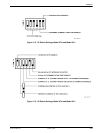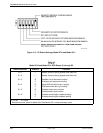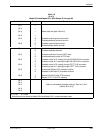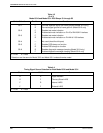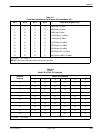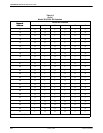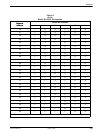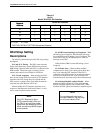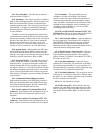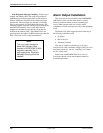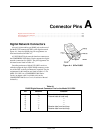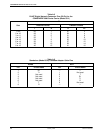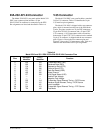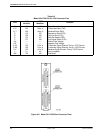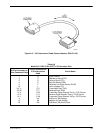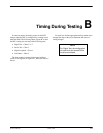
Installation
4-253510-A2-GN32-50 January 1998
S2-1–S2-4: Data Rate – The DSU has ten data rate
selections. Refer to Table 4-5.
S2-5: Streaming – This strap is provided at a tributary
DSU to detect when the terminal is streaming (that is, the
RTS circuit from the DTE remains on longer than the
streaming terminal timer). This selection is only effective
when the DSU is strapped for switched RTS operation.
Streaming detection will not be performed if the DSU is
in a test condition.
The DSU activates the streaming timer whenever the
customer Request-to-Send (RTS) circuit turns ON, and it
declares the streaming condition if the circuit is still ON at
the end of the timer interval. If the circuit is turned Off
before the end of the interval, the timer is reset. The
timeout is fixed at 27 seconds for subrate speeds of 19.2
and below, and at 3 seconds for 38.4, 56, and 64 kbps.
S2-6: System Status – When enabled, the DSU turns
off the DTE Data-Set-Ready (DSR) interface lead when
the network sends the Out-of-Service or Out-of-Frame
message, or no signal is received from the network. When
disabled, a network alarm has no affect on DSR.
S3-1: Faceplate Disable – This strap controls the LL,
TP, DL, and RL test switches on the DSU’s front panel.
When Switch S3-1 is open, the front panel switches are
disabled and the DSU will not respond to any faceplate
test requests. When S3-1 is closed, the faceplate switches
are enabled. Depending on how this strap is set, the DSU
will or will not respond when these switches are pressed.
This selection is designed to prevent accidental disruption
of data transfer.
S3-2: Continuous/Switched Request-to-Send –
When enabled (continuous), the DSU holds its internal
RTS circuit ON independent of the DTE RTS interface
lead. When disabled (switched), the DSU internal RTS
circuit follows the DTE RTS interface lead.
S3-3: Local Loopback (LL) through EIA-232-D
Connector – When enabled, this strap permits the use of
Pin 18 of the EIA-232-D interface to initiate a Local
Loopback.
S3-4: Local Loopback (LL) through CCITT V.35
Connector – When enabled, this strap permits the use of
Pin LL of the V.35 interface to initiate a Local Loopback.
S3-5: Scrambler – This strap enables the data
scrambler to be used with 64 kbps Clear Channel
operation. Select this strap to reduce the probability of
customer data accidentally generating network control
codes. The DSUs at each end must be 3500 Series DSUs,
and both must be strapped the same (scrambling or no
scrambling). Unless all DSUs on a circuit are 3500s,
scrambling should be disabled.
S3-6: EIA-232-D/V.24 DTE Interface/CCITT V.35
DTE Interface – This strap selects either the EIA-232-D
port or the V.35 DTE port as the active interface.
S4-1 – S4-6: Network Address – Network Addresses
are only required for 3510 tributary DSUs installed in
DATAPHONE II 2600 diagnostic networks. Network
addresses must be unique on the multipoint network.
Obtain the network address from the installation order or
contact the network management center.
S5-1: Signal Ground – Frame Ground – This strap
connects Signal Ground to Frame Ground, or separates
Signal Ground from Frame Ground. (This strap only
applies to Model 3510 DSUs. For the Model 3511 DSUs,
the strap is on the UAC.)
S5-2: Test Mode Indication – When this strap is
enabled, Pin 25 in the EIA-232-D interface of the DSU is
ON to indicate when the DSU is in a test condition; it is
Off when the DSU is operating normally. When this strap
is disabled, Pin 25 is opened toward the DTE.
S5-3: Test Mode Indication – This strap forces the use
of Pin NN of V.35 interface of the DSU to indicate when
the DSU is in a test condition. When this strap is disabled,
Pin NN is opened toward the DTE.
S5-4: Not used. Should be left open.
S5-5: DSR Always ON – When enabled, this strap
overrides any other DSR-related straps and ensures that
DSR is always ON as long as the DSU has power and is
functioning. When disabled, DSR is an active interface
lead.



